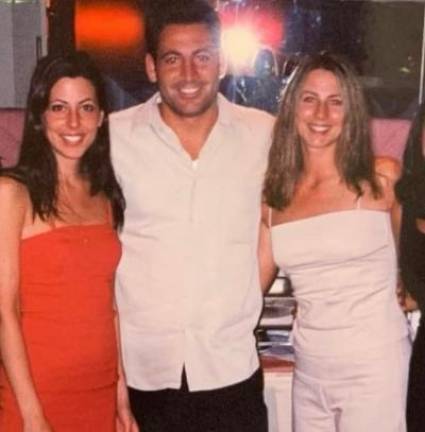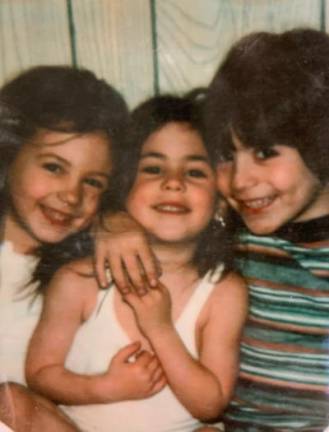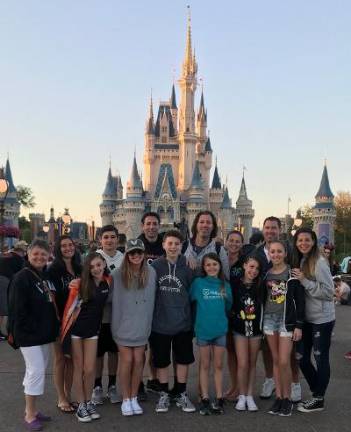Death spurs family, friends to get colonoscopies
FREDON. Sisters campaign for colorectal-cancer screening to begin at a younger age.



Tara Templeton of Fredon and her sister Marlo Moleski of Hillsborough adored their brother Michael Viscel Jr.
The trio were very close growing up and they stayed close through adulthood.
He died of colorectal cancer on Thursday, Dec. 27, 2018, surrounded by his family.
“Michael was diagnosed in August of 2016,” Templeton said. “He fought for two years and four months.”
Dr. Kahlam Sarwan, a gastroenterologist with offices in Newton and Hackettstown, said about 149,500 cases of colorectal cancer are diagnosed each year and 52,850 die annually of the disease. March is Colorectal Cancer Awareness Month.
“It is the third most common cancer in men and second in women in the U.S.,” Sarwan said. “The majority of cases (greater than 90 percent) are diagnosed over the age 50 but recently more are being diagnosed under the age of 50.
“It is estimated that over half of the cases could be prevented by regular colonoscopy screening. The majority of colorectal cancers start out as small polyps. Most early colorectal caners have no symptoms. The purpose of colorectal screenings (colonoscopy) is to detect and remove these polyps when they are small and have not spread.”
Because of the increasing number of cases in people younger than 50, those age 45 and older are urged to undergo screening.
Colorectal cancer treatment depends on the size, location and how far the cancer has spread. Common treatments include surgery to remove the cancer, chemotherapy and radiation therapy.
Templeton said, “People in their 30s are affected too and even younger. So the key is to listen to your body, look for any symptoms and if there is a family history, you must get screened earlier.
“Demand tests, be your own advocate. Your life can be on the line.”
She pointed out that insurance companies likely will not pay for a colonosopy for a patient in their 30s.
“It would not be approved unless there is a family history or a doctor’s recommendation because of a serious concern. Forty-five is the age right now. I am hoping this will change soon. It should be much younger.”
Though many cases have no warning signs, the Mayo Clinic says symptoms can include “persistent change in your bowel habits, including diarrhea or constipation or a change in the consistency of your stool; rectal bleeding or blood in your stool; persistent abdominal discomfort, such as cramps, gas or pain; a feeling that your bowel doesn’t empty completely; weakness or fatigue; or unexplained weight loss.”
Many fear the “prep” for a colonoscopy. The night before the test, patients drink a prescribed fluid, which cleanses the body.
The outpatient procedure takes place early the next morning. Patients are under a “twilight sedation” and feel nothing. The test takes about 20 minutes.
Dizzy, coughing
Templeton said her brother had gone to doctors about stomach issues but not one of them recommended a colonoscopy.
“He was at work in August of 2016 and felt dizzy and started coughing,” she said. “He noticed a little blood on the tissue after he coughed into it. After work, he took himself to the local hospital and they did a chest X-ray only to find a mass on his lung.
“Needless to say, he was in shock. In the next few weeks, after further testing, Michael was diagnosed with Stage 4 colorectal cancer. It had metastasized from his colon to his lung: they gave him two to three years to live.”
He asked Templeton, Moleski and their mother to come to his house.
“That day is forever etched in my mind,” Templeton said. “Aside from the day my brother passed, I would have to say it was the saddest day of my life. I remember the tears in his eyes as he told us it was cancer and the doctor predicted he had two years of life left. He was only 42.
“I felt this wave of anger and sadness come over me. My whole body was shaking. My family’s lives were changed forever.”
Moleski said she still finds it difficult to think or talk about her brother’s illness.
“It was and still is a completely unexpected, heartbreaking tragedy for my brother and for his/our entire family,” she said. “It’s not fair that it happened to him, and it will continue to break our hearts every single day that it did.”
Both Templeton and Moleski had colonoscopies before their brother’s death at the recommendation of their doctors although there was no family history of the disease.
His death was a huge impetus for other family members and friends to get the test.
His childhood friend, Michael Derosa, was one of them.
“I did mine six weeks after Michael passed, and only because of him,” he said. “While I was fine, they found three polyps. Those polyps could have turned to cancer had I not had them removed.
“I only did it because of Michael. My wife, Danielle, did hers because of him as well.”
No longer suffering
Michael’s wife, Nicole, said that with such feelings of loss, she also felt peace for Michael when he died because he was no longer suffering.
“So much sadness and uncertainty filled my thoughts when Michael passed as I had spent 30 years with him. How would I live without him?” she said.
“Michael and I attended the pulmonologist appointment to hear the results of the biopsy they took of the mass on his lung - it was the Monday after he was in the hospital for a week.
“We had done many things as a family prior to the diagnosis so it wasn’t out of the ordinary to do things as a family. The difference after the diagnosis was knowing it might be the last at any point, so we enjoyed every second of the time we had together and making memories to last a lifetime.”
The loss of her husband and best friend of 30 years and the father of her children has caused her unimaginable sadness.
“It’s sadness in many ways a lot of which that Michael isn’t here to see his amazing children mature and all their achievements,” she said. “I lost the biggest part of my life the day he passed. He was my everything.”:
Their daughter, Samantha, said she felt sad and lonely when her father died but more angry than anything else.
“I couldn’t understand why this would happened to me and my family,” she said. “And I couldn’t help but think of all my accomplishments my dad would miss. In my mind, it wasn’t fair and we didn’t deserve this to happen.
“I remember my mom and dad bringing my brother and I down to the couch and they sat us down. I immediately knew bad news was coming because this was the way they always told us bad news. My brother and I knew my dad was sick the week before but didn’t know to the extent and would never have imagined cancer. When I heard the words cancer, a pain shot right to my heart.”
Now, feelings of sadness come and go in her life.
“To honor my dad and cheer myself up when feeling sad, I got his birthday and hand writing tattooed on my wrist so I can look at it and be reminded of him,” she said. “Most importantly in these times of sadness, I remind myself he is always there with me and walking through life with me every step of the way.”
People in their 30s are affected too and even younger. So the key is to listen to your body, look for any symptoms and if there is a family history, you must get screened earlier. Demand tests, be your own advocate. Your life can be on the line.” - Tara Templeton of Fredon